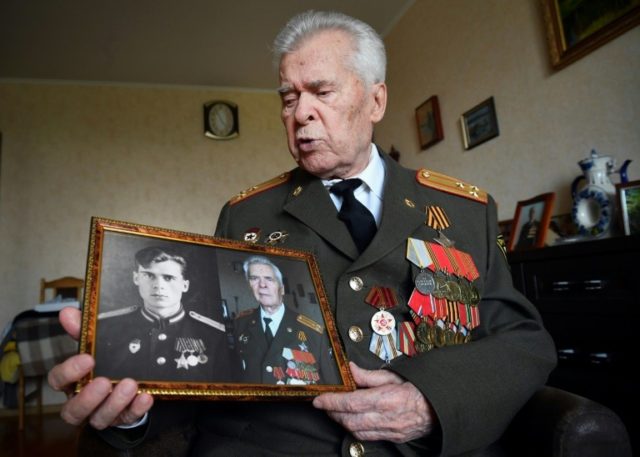Moscow (AFP) – Alexander Glagolev’s face lit up at a mention of the grand military parade going ahead in Moscow this week despite the coronavirus pandemic.
For the 94-year-old veteran, it is Russia’s duty to mark the 75th anniversary of Soviet victory over Nazi Germany with tanks and troops parading through Red Square.
“It is important to show the might of our armed forces,” he told AFP in an interview ahead of Wednesday’s parade, saying such events have “an immense educational role”.
Glagolev himself paraded on Red Square in 2000, the year Vladimir Putin first became Russia’s president.
“The parades are so that we do not lose our memories,” he said in his Moscow flat, his uniform covered with medals.
World War II, known here as the Great Patriotic War, took a heavy toll on the Soviet Union, with an estimated 27 million soldiers and civilians killed, by far the most casualties of any country.
Russians always mark Victory Day on May 9 with a grand military parade but this year’s event — planned as one of the biggest yet — had to be postponed when the coronavirus pandemic hit the country.
After eventually recording the third-highest number of cases in the world, Russia said it had the epidemic under control and lifted lockdowns, allowing Putin to reschedule the parade for Wednesday.
Critics have accused authorities of rushing to ease restrictions in order to push ahead with the parade and a July 1 vote on constitutional reforms that, among other measures, will reset presidential term limits and potentially allow Putin, 67, to stay in power until 2036.
Glagolev praised Putin for deciding to go ahead with the military festivities despite the health crisis.
“It’s all done to boost the profile of the country. She is worthy of it,” the sprightly veteran said.
Brothers killed in action
He said he also approved of Putin’s plan to amend the constitution and would vote “yes” on July 1.
“I know he could serve two more terms. I’m not against it, because Putin is a man of experience,” he said.
Glagolev said he had been invited to watch the parade from the stands on Red Square but was unsure if he would attend because of the physical strain.
Like millions of Soviets, Glagolev’s family paid a huge price for victory in the war.
Both of his brothers were killed in action — Georgy died on the Leningrad front in 1942 and Nikolai was killed during the battle of Smolensk a year later.
Born in the Siberian city of Minusinsk, Glagolev was sent to the front in August 1944 at the age of 18.
He fought Nazi troops on the Courland Peninsula in modern-day Latvia, among other battles, and spent several months in hospital after being wounded by shrapnel, before returning to the front.
He was awarded the Order of Glory for personally disabling two tanks and killing 10 enemy soldiers in a battle in March 1945.
He stayed in the military after the war, until his retirement in 1979 and has since spoken often to younger Russians about his experiences in the conflict.
“Obviously, I would like to talk less about war and politics,” he said in his kitchen, a glass of Georgian wine in hand.
“Women, for example, now there’s a topic for conversation,” he said, showing a tattoo on his arm reading “Anya”, the name of one of his first girlfriends.
Widowed a decade ago after 56 years of marriage, Glagolev quipped that he’s now in a relationship with a “younger woman” 20 years his junior.
“To love all ages yield surrender,” he said, quoting Russia’s national poet Alexander Pushkin.

COMMENTS
Please let us know if you're having issues with commenting.